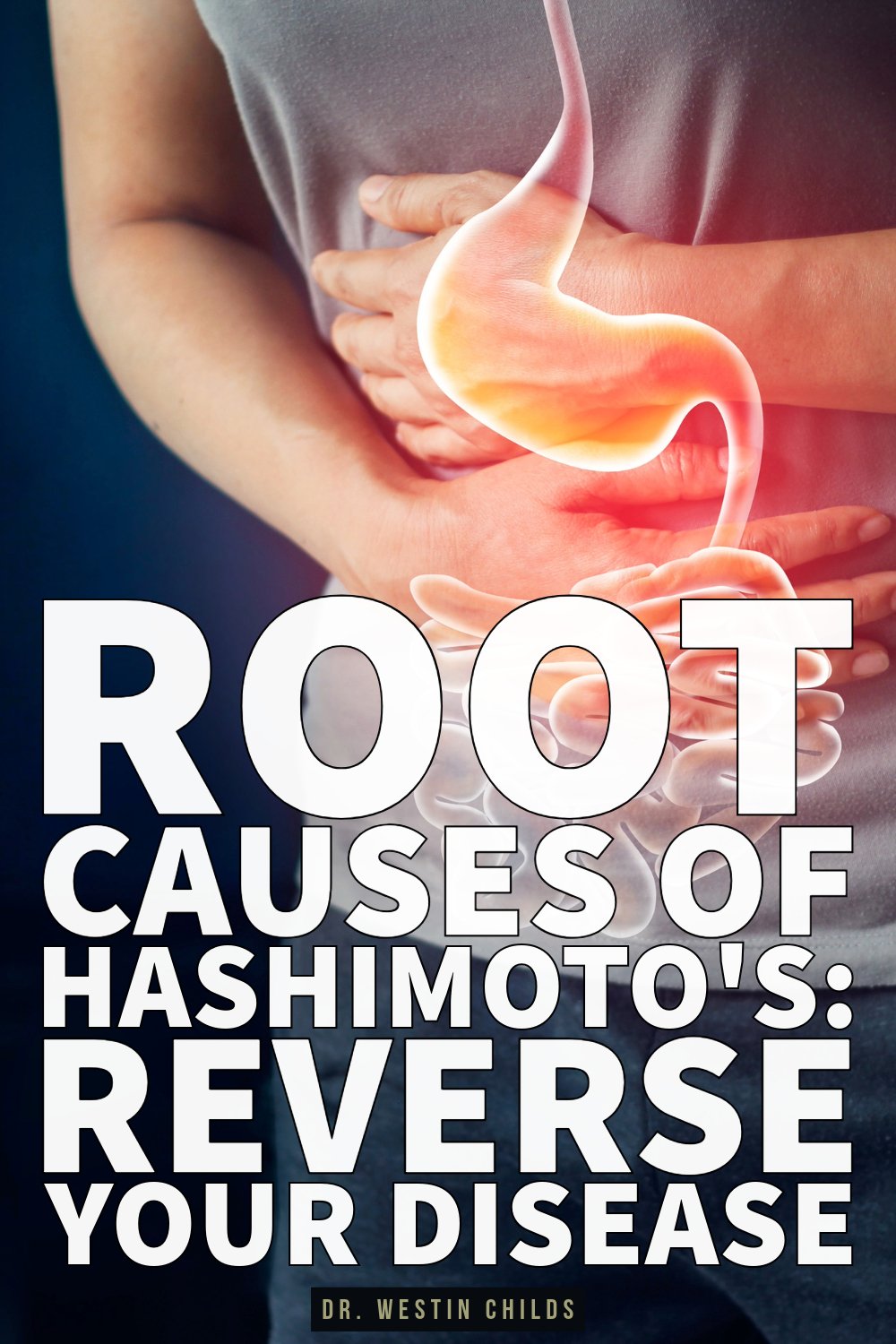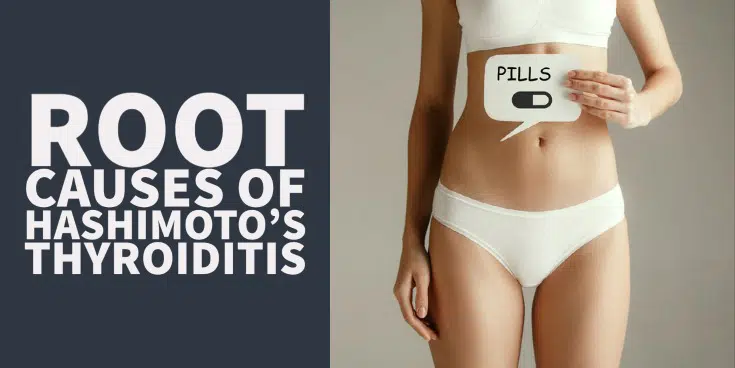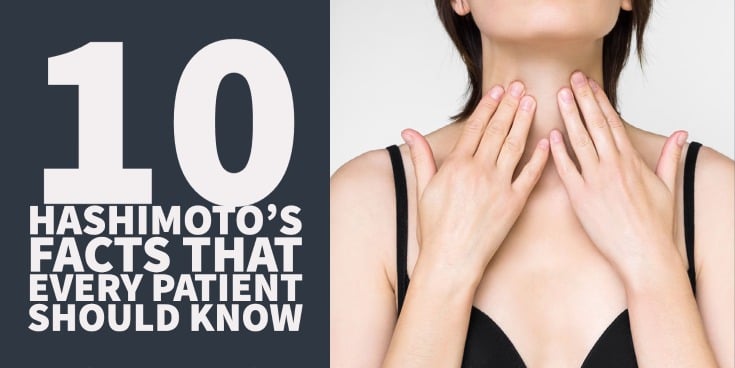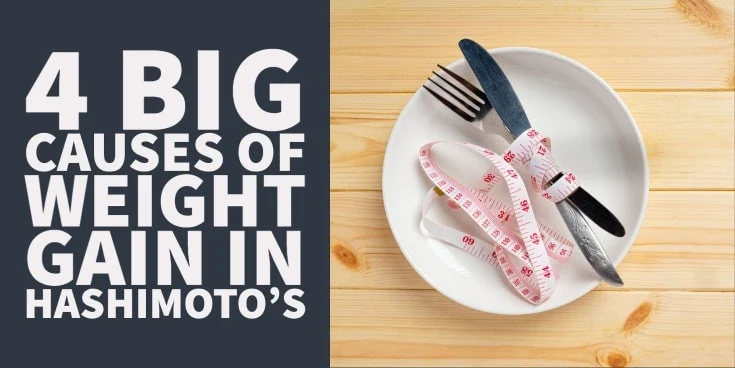The idea of finding the root cause of your thyroid condition is an appealing thought.
After all, if you can find the thing that caused your Hashimoto’s wouldn’t it then be possible to treat that problem and reverse your disease?
Well, yes and no.
Yes in the sense that there is always something that triggers Hashimoto’s and no in the sense that it may not always be treatable or reversible.
But that doesn’t mean it’s not worth the effort to do some digging to find what is the underlying cause of your condition.
And that’s exactly what we are going to do today:
Dive into some of the known (or suspected) causes of Hashimoto’s to give you an idea of how you should approach treatment.
Because if you can reverse whatever conditions caused your Hashimoto’s, there’s a good chance you may be able to put it into remission.
And even if you can’t, you will definitely have improved your symptoms along the way.
DOWNLOAD FREE RESOURCES
Foods to Avoid if you Have Thyroid Problems:
I’ve found that these 10 foods cause the most problems for thyroid patients. Learn which foods you should avoid if you have thyroid disease of any type.
The Complete List of Thyroid Lab tests:
The list includes optimal ranges, normal ranges, and the complete list of tests you need to diagnose and manage thyroid disease correctly!
6 Root Causes of Hashimoto’s Thyroiditis (These conditions CAUSE Hashimoto’s)
Let me point out a few important things here before we talk about the triggers:
The first is that we don’t actually know for sure what causes Hashimoto’s.
We have a lot of evidence that connects certain conditions and events to the onset of Hashimoto’s.
But, as always, correlation does not equal causation.
That said, it’s encouraging to see that many patients have seen a near-complete resolution in their condition by treating the very issues we are about to discuss.
But if you are someone who wants to wait for “concrete” data or science then you will probably be left sitting there twiddling your thumbs for quite a while.
The reason is simple:
From the perspective of the scientific community, there isn’t a big rush to try and “figure” out Hashimoto’s.
Doctors and researchers believe that autoimmune diseases can’t be reversed and that by taking levothyroxine you’ve effectively solved the problem.
If this doesn’t sit well with you, though, and you don’t want to sit by and watch your own body destroy your thyroid gland, let’s talk about some potential triggers that may help you feel better:
#1. Stress (emotional, physical, and/or social)
The first is stress.
Stress, in my opinion, is probably the single most important trigger of Hashimoto’s thyroiditis.
And by stress, I am referring to all types of stress.
The most prominent include:
- Emotional stress – This type of stress stems from issues such as the inability to draw clear boundaries in your life or stress from the impact of relationships.
- Physical stress – Physical stress includes things like exercise, trauma or accidents, intense workouts, and so on.
- Social stress – Social stress tends to be more mental in origin and can stem from anything that you perceive as pressure. This may include things like issues with your work environment and so on.
What’s very clear is that stress can have both a positive and negative impact on our bodies.
It can be good if it’s applied in a measured and calculated way.
But once you tip the scales and it becomes too much for the body, the consequences are profound.
My experience suggests that major life events can have a dramatic impact on your health and can trigger the onset of all sorts of diseases including Hashimoto’s and other autoimmune diseases.
Unfortunately, even if you find out that stress did, in fact, cause your Hashimoto’s, it’s one of those triggers that treating it may not reverse your condition.
Let’s examine this further:
Imagine you are someone who developed Hashimoto’s after some stressful event in your life, say a divorce or the loss of a loved one.
Knowing this doesn’t really help you because you can’t go back in time to undo the effects of this incident.
Whatever happened to your body triggered genetic changes which caused the manifestation of Hashimoto’s.

Does this mean hope is lost?
Not at all. There are still things that you can do to increase how well your body TOLERATES stress but it’s unlikely that you will be able to completely eliminate stress from your life, especially in all of its forms.
But if you believe that stress did trigger Hashimoto’s in your body then focusing on things like meditation and the use of adrenal supplements is a great option.
Repeated bouts of stress can also cause flare-ups in your Hashimoto’s.
Time and time again I’ve seen people who develop Hashimoto’s due to something like divorce and then experience flare-ups down the line as other stressful events occur.
#2. EBV Viral infection
Another common trigger of Hashimoto’s (and other autoimmune diseases) is a virus known as EBV.
EBV stands for Epstein Barr virus but you may know it as mono or infectious mononucleosis.
The EBV virus is part of the herpes virus family and EBV especially is known to cause issues in the immune system (1).
The EBV virus is particularly good at evading your immune system and once you get this viral infection it stays with you for life.
The initial disease state is usually fairly mild and manifests similarly to that of strep throat.
But once your body gets the virus under control it goes back and hides in your cells where it can come out again during times of stress or when the immune system is weakened.
It’s sort of similar to chickenpox.
Once you get chickenpox you are immune from getting chickenpox again but during stressful times in your life, the same virus can rear its ugly head and manifest as shingles.
EBV doesn’t act in the same way but it is similar.
Another problem with EBV is that not everyone who has the disease will develop Hashimoto’s and not everyone with Hashimoto’s will have been exposed to EBV.
We know, though, that certain people seem to be more sensitive to the effects of EBV than others.
And it’s probably these people who have an issue with it.
Most people who are exposed to EBV have no problem getting the infection under control and never see or hear from the virus again.
Others have a much more difficult time.
These people may have a low-grade EBV infection that sort of sticks around and causes issues as the virus smolders on in the background.
Treating the EBV virus, in this case, can potentially have a positive impact on Hashimoto’s.
EBV can be treated with a combination of prescription antiviral medications or with over-the-counter antivirals.
I’ve seen variable success in treating EBV among Hashimoto’s patients.
Sometimes the result is great and I see a huge improvement and other times it doesn’t seem to matter much at all.
Testing for the EBV infection can also be tricky.
Standard tests typically just tell you if you’ve been exposed to the virus but they don’t tell you WHEN it happened.
And since up to 70-80% of people will be exposed to the virus at some point in their life, it can be hard to know when you were first exposed.
Certain EBV viral titers can be used to tell you if you have a subacute infection, though, and these can be useful in certain situations.
#3. H. Pylori bacterial infection
Other infections also have the potential to trigger Hashimoto’s but this one is a bacteria.
EBV, a virus, is known to cause issues with the immune system, and a similar process can occur via certain bacterial infections.
H. Pylori is one of those.
H. Pylori is short for helicobacter pylori which is a bacteria sets that can set up residence in your stomach.
H. Pylori is well known by the scientific community because it causes stomach ulcers.
This bacteria prefers to live in a low stomach acid environment so anything that you are doing to your body to reduce the acidity in your stomach may create a breeding ground for this bacteria to thrive.
Once an infection has taken root, this bacteria gets into your stomach lining and causes inflammation in the stomach wall.
This inflammation is probably why infections with H. pylori increase your risk of developing certain types of stomach cancer (2).
But in addition, and more relevant to our discussion is that an infection with H. Pylori also causes issues with the immune system.
Infections with H. Pylori have been implicated in triggering Hashimoto’s thyroiditis and may also be associated with Hashimoto’s flare-ups as well.
It is estimated that up to 50% of the world’s population has been infected with this bacterium!
And your risk of developing this type of infection increases as you take drugs and therapies that lower your stomach acid.
Even over-the-counter medications such as acid blockers can do this.
And because thyroid patients tend to experience issues with low stomach acid due to their thyroid, you are already at an increased risk for developing this infection just because you have a thyroid problem.
H. Pylori is similar to but different from an infection with EBV.
Yes, both pathogens cause issues with immune function but the primary difference between them is that it is possible to completely eradicate an H. Pylori infection.
It can be somewhat difficult to completely eradicate an H. Pylori infection so the use of multiple antibiotics and other therapies are typically necessary.
The good news, though, is that you can completely eradicate it.
And the eradication of this infectious pathogen may help treat your Hashimoto’s thyroiditis.
For this reason, it’s a very good idea to check for H. Pylori infection if you have Hashimoto’s.
This is especially true if you are experiencing any sort of intestinal issue such as acid reflux or if you have taken acid-blocking medications in the past.
There are simple ways to test for H. Pylori including a breath test as well as a blood test (3) (though they differ in their ability to diagnose active vs old infections).
Lastly, you should be aware that even if you eradicate an H. Pylori infection in the past it may recur throughout your life.
This recurrence may be a source of flare-ups and increased antibody production in certain patients with Hashimoto’s!
So if you have ever been treated for H. Pylori make sure you keep it in the back of your mind that it may recur and cause issues down the road.
#4. Nutrient Deficiencies
You probably already know that nutrient levels play an important role in how your body functions.
I’ve included nutrient deficiencies here not because I think that they directly cause Hashimoto’s thyroiditis but instead because they create an environment that makes you more susceptible to various other triggers.
As an example, imagine that you have Vitamin D deficiency.
Vitamin D deficiency by itself isn’t going to cause Hashimoto’s but a low vitamin D level can impair your immune system (4) which makes you more susceptible to triggers such as stress and/or infections.
When your body is in an impaired state it may not be able to fight off autoimmune changes which it otherwise could.
Make sense?
With that in mind, let’s talk about some of the most important nutrients and how they relate to both thyroid function as well as immune function.
There are many but I want to hit on some of the most important:
- Vitamin D – Vitamin D deficiency is incredibly common among the entire population but especially in those with Hashimoto’s. You can easily test for Vitamin D deficiency with lab tests and you should absolutely do this if you have Hashimoto’s. Once you find out you are deficient you can take a micellized Vitamin D supplement to increase your levels rather quickly. Normalizing your Vitamin D level will help your immune system function.
- Zinc – Zinc plays many important roles in thyroid function and immune function (5). In addition, many thyroid patients are zinc deficient. Testing for zinc deficiency isn’t very accurate so it’s often better to just supplement with zinc. Low zinc can impair immune function as well as impair T4 to T3 conversion.
- Selenium – Selenium plays an important role in reducing thyroid gland inflammation. In fact, low selenium may allow for thyroid gland inflammation to occur which sets you up for developing thyroid autoimmunity. Some studies (6) have shown that taking selenium by itself can even reduce thyroid antibodies! Taking selenium is easy and something that every patient with Hashimoto’s should consider.
- Glutathione – Glutathione is really an extension of selenium because your body cannot produce glutathione (7) if your selenium levels are too low. Glutathione helps reduce thyroid gland inflammation and can be used as a supplement in those who have Hashimoto’s thyroiditis.
Testing for nutrient deficiencies is something that every patient with Hashimoto’s should do!
It’s easy and relatively cheap to supplement as necessary.
Please note, though, that testing for nutrient deficiencies is not always required!
Some tests as simply not accurate and basing your supplement decisions off of faulty tests will not do your body any good.
When you look at the safety profile of these nutrients, it’s often better to just assume you are deficient and supplement accordingly.
#5. SIBO/SIFO (bacterial/fungal overgrowth syndromes)
What we are really talking about here is your gut and this should come as no surprise to you right now.
Your gut is the site of immune system regulation and it is really the front line between you and the outside world.
We’ve already touched on many aspects of gut function and how they lead to Hashimoto’s thyroiditis through our discussion on H. Pylori and stress.
Here we are discussing what is known as overgrowth syndromes that occur in your intestinal tract.
Specifically, we are talking about intestinal bacterial overgrowth as well as fungal overgrowth.
SIBO stands for small bacterial intestinal overgrowth and SIFO stands for small intestinal fungal overgrowth.
What happens in these conditions is this:
At any given time, you have various types of bacteria in your gut.
And these bacteria communicate with your immune system, they provide nutrients for your body, help to manage your hormones, and much more.
What you may not realize, though, is that your ACTIONS can impact these bacteria.
Doing things like eating unhealthy foods, undergoing stressful situations, killing them off by using prescription antibiotics or herbal antibiotics, taking stomach-blocking drugs, and more, can all negatively impact these little bacteria.
These things change the environment in your gut which allows the overgrowth of certain species of bacteria and fungus.
It’s not always “bad” bacteria either! Even an overgrowth of “good” bacteria can cause issues.
These issues include problems with immune function and inflammation which can then cause problems with autoimmunity (8).
This problem is exaggerated in thyroid patients because low thyroid conditions slow down intestinal motility.
As you slow down the speed of your intestines this increases your risk of developing SIBO (9).
You can test for these overgrowth syndromes and treat them as necessary.
Treating and/or normalizing your gut bacteria won’t necessarily “cure” your Hashimoto’s but I have seen significant improvement in most patients who improve their gut.
Right now traditional doctors are not as aware of these overgrowth syndromes so you may need to see a gastroenterologist to get tested and treated for them.
#6. Gluten sensitivity (Celiac & NCGS)
And I’m not just talking about Celiac disease, though that would be included in here as well.
What I am really talking about are those people who cannot tolerate gluten.
Really what you need to know is that gluten can cause inflammation in both the gut and the body if you are someone who is sensitive to it.
This inflammation then causes problems in the lining of your gut and leads to something called increased intestinal permeability or leaky gut.
Gluten causes damage to the lining of your intestines which are there to protect YOU from foreign objects getting in.
As the damage increases, larger particles of bacteria can enter into your bloodstream and then interact with your immune system.
This series of steps can then lead to autoimmunity due to something called molecular mimicry.
A lot of people misunderstand the difference between Celiac disease and non-celiac gluten sensitivity.
Nonceliac gluten sensitivity, or NCGS for short (10), is more of a gluten allergy or intolerance than it is an autoimmune condition like Celiac disease.
In Celiac disease, your immune system creates antibodies to gluten which causes inflammation and damage throughout the body.
In NCGS, your body has a difficult time managing gluten and responds to gluten with inflammation, diarrhea, constipation, visceral hypersensitivity, and immune disruption.
It’s not a true autoimmune disease but it’s still a problem in processing gluten and it should be taken seriously!
Right now it’s very easy to diagnose Celiac disease but diagnosing NCGS can be somewhat difficult (11).
The good news is that you don’t really have to worry much about diagnosing.
Why?
Because it’s incredibly easy to treat the problem by simply taking gluten out of your diet!
Because the prevalence of gluten issues is so high among patients with Hashimoto’s, I can’t really think of a reason NOT to do a trial run of removing gluten from your diet.
Removing gluten from your diet for 90 days is a great idea and may dramatically help improve inflammation and immune function in your body.
Wrapping it up
Hashimoto’s thyroiditis can appear to be a mysterious disease but it doesn’t have to be.
While it may not be possible to cure or reverse your condition, there are things that you can do that can have an impact on your disease state.
By doing some digging into your root cause you may be able to uncover what triggered your immune problem.
And even if you don’t discover the trigger of your particular disease, you will not have done any harm along the way!
Changing up your diet, taking supplements, and checking for things like gluten sensitivity as well as other bacterial or viral infections are easy to do and only have the potential to help your overall health.
A word of warning, though, before you undertake this journey:
You will most likely have to do this alone! Do not count on your doctor to have the necessary knowledge or ability to help you at every step.
Most conventional doctors are more interested in MANAGING Hashimoto’s with thyroid medication than they are digging deep to try and reverse it.
Unless you have a very knowledgeable doctor who is willing to work with you, it will be up to you to do a lot of the research.
Luckily, I have tons of information to help you along the way!
Now I want to hear from you:
Were you aware of these triggers?
Do you have an idea of what you think may have triggered Hashimoto’s in your body?
Have you attempted to treat any of these conditions?
If so, how did it work out for you?
Leave your comments or questions below!
Scientific References
#1. https://pubmed.ncbi.nlm.nih.gov/28376031/
#2. https://pubmed.ncbi.nlm.nih.gov/33287914/
#3. https://www.mayoclinic.org/diseases-conditions/h-pylori/diagnosis-treatment/drc-20356177
#4. https://pubmed.ncbi.nlm.nih.gov/31323357/
#5. https://pubmed.ncbi.nlm.nih.gov/29324654/
#6. https://pubmed.ncbi.nlm.nih.gov/11932302/
#7. https://pubmed.ncbi.nlm.nih.gov/21782571/
#8. https://pubmed.ncbi.nlm.nih.gov/33224194/
#9. https://pubmed.ncbi.nlm.nih.gov/24944923/
#10. https://pubmed.ncbi.nlm.nih.gov/25642988/
#11. https://www.ncbi.nlm.nih.gov/pmc/articles/PMC4488826/









